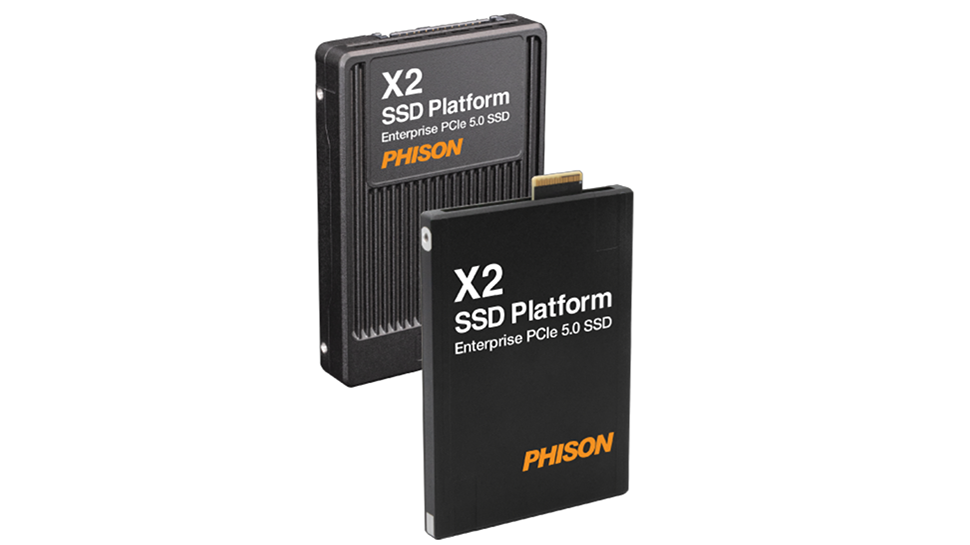More 128TB SSDs are coming as almost no one noticed this launch — another SSD controller that can support up to 128TB appeared paving the way for HDD-beating capacities::Phison quietly revealed an updated X2 SSD platform at CES
as almost no one noticed this launch
That’s because we’re having trouble just getting food. A shiny new and expensive SSD isn’t even on the list at this point.
I read 128GB SSDs and thought “who cares”
impressive.
That’s cool and all, but the only reason I would want that capacity is to store stuff that I would want to store for much longer than a lifespan of an SSD. Only HDD’s have that kind of lifespan. Like a gigantic video library/archive. I guess these aren’t for me.
But if they drive down the price of high capacity, HDDs, all the better. 
Correct me if I’m wrong here, but I remember that SSDs lifespan mainly depends on how much you overwrite the drive. For 128TB, it should take you a very long time to overwrite the entire drive, let alone couple hundred or thousand times to kill the drive. I know that bit rot also happens on SSDs, but that applies to HDDs as well, and good drive maintenance practices should alleviate the issue. Though for archival purposes/cold storage, tape drives are probably better.
The lifespan of your data isn’t nearly as long as the lifespan of the cells storing your data. Due to leakage of of power from the cells, and the more and more dense these cells are being packed (leading to smaller differences between what voltage maps to what binary value), SSDs have issues with bitrot. With a disk this size you would need to have data regularly checked and refreshed (rewritten) to ensure the data being stored was still correct and not corrupted.
All storage has issues with bit rot. There haven’t been any studies to show that SSD is disproportionately affected.
In 2016, HDDs were more reliable (MTBF).
In 2022, for the first 5 years, SSDs are looking more reliable. With more of a constant failure rate (1%/yr), than the increasing failure rate of HDDs after 5 years.
(Caveat: not just bit rot, but general failure data.)
There’s a caveat there. We’ve had some new tech in SSDs come out very recently, new enough not to be in those charts will still have to see.
What is bit rot?
When bits of data on a storage medium goes bad for seemingly no reason. If you’ve ever had a library of files and all of a sudden there’s a file that won’t open even though you haven’t touched it.
SSD lifespan is expressed in terabytes written (TBW), wherein yeah they can sustain so many writes to the flash chips before they can’t anymore.
Really depends on the content, type of use, architecture, and the file system. You’re not wrong, some situations would take centuries to wear this guy out.
It’s not for you. It’s for enterprises, but I can drive down the prices of shit you would use. No noise, better performance, less energy; it’s a win-win.
Yeah, that’s what I figured
HDDs typically don’t last as long as SSDs due to their mechanics failing. Data is there but it just won’t spin. I’ve yet to have an SSD actually fail. Every HDD I’ve ever owned, save one, has.
This has not been my experience at all, nor is what I know from general knowledge— that, due to rewriting, SSDs become unusable within 3-5 years, whereas the typical lifespan of an enterprise HDD is 5-7 years, perhaps longer.
In my own use, SSDs of mine seem to crap out around 5-ish years, whereas HDDs get 7+, and the $/GB ratio makes it a no-brainer, esp for video library/archive storage where it’s mostly read/write no rewrite and long-term storage with no need for very high-speed access (like for editing 4/8K).
I buy enterprise HDDs that never spin down and last forever— they use more power, but I don’t pay for that. SSDs wear out just by reading and writing and become unreadable over time.
If I were editing giant chunks of video in 8K, and needed enormously fast cache rates and transfer speeds over thunderbolt 4, obviously, I’d go with the SSDs, especially if I had a studio I was working for that could afford to replace them when they were out. But that’s not my use case.
I’ve had at least 8 SSDs fail in various ways personally.
I care about affordable stuf not luxury .
deleted by creator
I may have just jizzed in my pants
Maybe the price will dry you off.
Realistically, a couple of 10TB drives would have me covered for like a decade at least. If these massive drives bring down the price of much smaller ones, I’m a happy boy.
That’s some nice density you got there. While you’re at it…
Can I get a 12.8TB drive 1/10th the physical size (m.2 2230) and has a steady transfer rate of 2.4GBs that costs <$200 dollhairs? Pretty please 🙏
Unless you’re using a NUC or similar, M.2 is the worst form factor - and consumer grade drives are all shit. If you’re in the market for storage I’d recommend looking at used enterprise U.2 drives in the 0.5-1 DWPD range. Adapters (PCIe or M.2 to U.2) are super cheap.
Edit: 12.8TB is gonna be a stretch, obviously, but even Solidigm TLC drives are quite a bit better than any consumer grade drives and I’ve seen some of the 7TB models go for surprisingly cheap.
I am using NUCs.
Sir, you forgot a 0 their…
There there. It’s okay.
That’s they’re they’re.
How expensive are they, $100,000 or maybe more?
$4.5k from a quick search.
Edit: I HAVE NO CLUE WHERE THAT NUMBER CAME FROM LAST NIGHT
https://www.tomshardware.com/news/samsung-128tb-petabyte-storage
This states that a 32tb ssd costs roughly $7000
That’s actually pretty reasonable.
Still can’t afford it.
Do you think the normal consumer would care? All that matters is for SSD to become as cheap or cheaper than HDDs or nothing
What’s the biggest HDD out there? I mean at sizes this big it’s a lot of data to lose in one go if it dies. Even if you have backups or whatever that’s a lot to have to restore.
Are we including magnetic tape?
Looks like they hit 580 TB a few years ago: https://www.pcmag.com/news/fujifilm-and-ibm-set-world-record-with-580tb-magnetic-tapes
I like 8TB drives for media. I know the rules of safe backup say you should have 3 copies, but I just have another 8TB drive for each one that’s in use and I do a sync every few months. The backup drives, when not hooked up to sync for backup, sit safely in anti static bags inside the boxes they came in, in a file cabinet drawer.
Who sells 80TB HDDs? None on the market that I know of.
I’ve seen SSDs hit 100TB, but those are $40k+. And more “reasonable” options like 64TB for $10k or so.
HDDs just reached 30TB, but I don’t think those are widely available yet. 24TB is the biggest you can expect to see for sale.
Ok so I’m wondering WTF he’s talking about.
Did he mean 8TB maybe?
I meant 8 TB
Man I has to read that 4 times before it registered. Fucking he’ll shits nuts
Call me when they somehow fit this on an SD card in another 10 years
Whatcha talking bout? There are many ads for 128 Tb drive on TEMU and Ali Express! Like for cereal man, they show proper sizes and everything!
.
.
/s if ya didn’t get it
I read it as 128GB. Then I was like, ohhhhhhhh. Sweet!
My laptop has a 256GB SSD, and even this still feels plenty to me. Not sure what I’d even do with 500 times that much space.
Store 3 new AAA games?
Should’ve added that I don’t use this laptop for gaming. I also don’t store multiple AAA games in parallel. But I get your point.
Games eat up my SSD at an alarming rate. I could see myself using several TB easily.
My steam deck typically has one big game installed at a time. At this point, I just want to finish baldurs gate 3 so I can delete it and put on some other games.
that’s for enterprise use; also plenty of uses in a data-driven world to run predictive models on.
I really need to clean up my picture library …
how much?
That’s cool and all. How many levels per cell? Can I have it in SLC? No? Ok then I’m good.



















